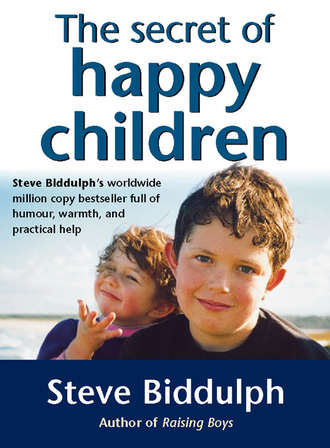
Полная версия
The Secret of Happy Children: A guide for parents

Copyright
Thorsons
An imprint of HarperCollinsPublishers Ltd. 1 London Bridge Street London SE1 9GF
www.harpercollins.co.uk
First published in Australia by Bay Books 1984
Revised edition 1988
Angus & Robertson edition 1995
Published by Thorsons 1998
© Steve and Shaaron Biddulph 1984, 1988, 1993, 1998
Steve and Shaaron Biddulph assert the moral right to be identified as the authors of this work
Illustrations by Allan Stomann
A catalogue record for this book is available from the British Library
All rights reserved under International and Pan-American Copyright Conventions. By payment of the required fees, you have been granted the nonexclusive, nontransferable right to access and read the text of this ebook on-screen. No part of this text may be reproduced, transmitted, downloaded, decompiled, reverse engineered, or stored in or introduced into any information storage and retrieval system, in any form or by any means, whether electronic or mechanical, now known or hereinafter invented, without the express written permission of HarperCollins ebooks
HarperCollinsPublishers has made every reasonable effort to ensure that any picture content and written content in this ebook has been included or removed in accordance with the contractual and technological constraints in operation at the time of publication
Source ISBN: 9780722536698
Ebook Edition © NOVEMBER 2012 ISBN: 9780007388318
Version: 2016-09-08
The secret of
happy
children
Steve Biddulph
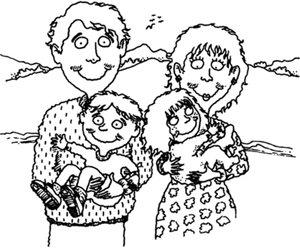

Dedication
Thanks to all in the Transactional Analysis community from the early seventies onwards, especially Colin McKenzie, Pat McKenzie, the Maslens, the Mellors, and Jean Grigor. These people both saved my life, and set me on this wonderful road. To my parents for a good start. To my partner Shaaron Biddulph for all that she has taught and given me. To Doro, June and everyone at Parent Network for bringing my work to England. To everyone at Thorsons UK. And to all of us parents everywhere, for struggling on and still remembering how to laugh.
Contents
Cover
Title Page
Copyright
Dedication
Foreword
1 Seeds in the Mind You hypnotise your children every single day. You may as well do it properly!
2 What Children Really Want It’s cheaper than video games, and healthier than ice-cream!
3 Curing by Listening How to help your child deal with an unkind world
4 Kids and Emotions What is really going on?
5 The Assertive Parent Firmness. Do it – now.
6 Family shape Dad? Who’s Dad?
7 Ages and Stages Do you mean this is normal?
8 Energy and How to Save It Good news – your children need you healthy and happy.
9 Special Situations How you can help if you’re a teacher, a politician, a grandparent, neighbour or friend.
Postscript
Keep Reading
Appendix
The Story Behind this Book
About the Author
About the Publisher
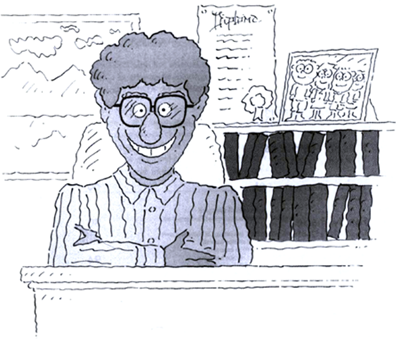
Foreword
Why are so many adults unhappy?
Think of all the people who have problems – who lack confidence, cannot make a decision, worry about little details, can’t relax, or can’t make friends with other people. Think of those who are aggressive, putting people down and ignoring the needs of those around them. Add to the above all those just holding on until the next drink or the next tranquilliser.
In one of the richest, most peaceful countries in the world, unhappiness is epidemic. One adult in every five will at some time need psychiatric care, one marriage in three ends in divorce, one adult in four needs medication to relax. It’s a great life!
Unemployment and difficult economic circumstances don’t help, but unhappiness is present in all income groups – rich, poor and in-between. It’s a problem, in fact, that no amount of money seems to solve.
On the other hand, we are often puzzled by some people’s constant cheerfulness and optimism. Why is it that, in some individuals, the human spirit blossoms in spite of apparent hardship?
The fact of the matter is that many people have unhappiness programmed into them. They have been unwittingly taught to be unhappy and are simply living out the script. When reading this book you may realise that, by accident, you are hypnotising your children into disliking themselves, and causing them to have problems which may last a lifetime.
How this happens and how to change it – in fact, how to create happy children – is what this book is all about.
1 Seeds in the mind
You hypnotise your children every single day. You may as well do it properly!

It’s nine o’clock at night and I’m sitting in my office with a tearful fifteen-year old girl. She is dressed in fashionable, older-than-her-years clothes, but the effect is only to make her look more helpless and childlike. We are talking about the fact that she is pregnant and what can be done about it.
This is familiar ground for me, and for anyone who works with teenagers. It doesn’t mean, though, that it can be hurried. What matters is that, for the young woman sitting in front of me, this is the worst day of her life and she needs all the support, time and clarity, that I can offer. About all, she must make her own decision.
I ask about her parents’ likely reaction – when they find out. She almost spits out the answer.
‘Oh, they’ll say they told me so. They always said I’d never amount to nothing!’
Later, as I drive home, that one sentence stays in my mind. ‘They always said I’d never amount to nothing.’ I’ve often heard parents talk to kids like that.
‘You’re hopeless.’
‘God, you’re a nuisance.’
‘You’ll be sorry, just you see.’
‘You’re as bad as your Uncle Merv’ (who’s in jail).
‘You’re just like your Auntie Eve’ (who’s fond of a drink).
‘You’re crazy, do you hear?’
This is the kind of programming that many youngsters grow up with; it is passed on unwittingly by overwrought parents and continues as a kind of family curse down the generations. It’s called a self-fulfilling prophecy because saying it often enough makes it come true. Children, with their brilliant, perceptive, strangely co-operative ways, will usually live up to our expectations!
These are extreme examples, which we’d all recognise at once as destructive. Most negative programming, however, is much more subtle. Observe children playing in a vacant block, climbing trees. ‘You’ll fall! Watch out! You’ll slip!’ cries the voice of the anxious mother from over the fence.
The slightly drunk father ends a half-hearted argument with his wife, who goes off in a ‘huff’ to buy some cigarettes. ‘There y’are son, never trust a woman. They’ll just use y’up.’ The seven-year-old looks up solemnly and nods. Yes, Dad.
And in a million sitting rooms and kitchens:
‘God, you’re lazy.’
‘You’re so selfish.’
‘You silly idiot, stop that.’
‘Dumb!’
‘Give it to me, stupid!’
‘Don’t be such a pest.’
What we have discovered is that this kind of comment doesn’t only have the obvious effect of making the child feel bad momentarily. Put-downs also have a hypnotic effect and act unconsciously, like seeds in the mind, seeds which will grow and shape the person’s self-image, eventually becoming true facts about the child’s personality.
How do we hypnotise our children?
Hypnosis and suggestion have long been a source of fascination to people. They seem slightly mystical and unreal and yet are well accepted scientifically. Most people have witnessed them, perhaps as part of a stage show, for getting help to cure a habit, or for relaxation.
We are familiar with the key elements of hypnosis: the use of some device to distract the mind (‘vatch ze vatch’), the commanding tone (‘you will feel nothing’), and the rhythmic, repetitious tone of the hypnotist’s speech. We also know about post-hypnotic suggestion, the ability to implant a command which the unsuspecting person later carries out, often to his or her dismay, at a given signal. It all makes for good theatre, but also for excellent therapy in the hands of a qualified practitioner.
What most people don’t realise, however, is that hypnosis is an everyday event. Whenever we use certain patterns of speech, we reach into the unconscious minds of our children and program them, even though we have no such intention.
The old concept – that hypnosis required an altered state of mind, or trance – has been abandoned. This was only one form of unconscious learning. The rather frightening truth is that the human mind can be programmed in normal waking life beneath the awareness of the person involved. Already in the US, many sales and advertising people are being trained in the use of hypnotic methods embedded in normal business conversation – a chilling concept (For more details, see ‘Further Information’ in the Appendix.) Fortunately hypnosis requires great skill to use in a manipulative way, and can be countered if the subject becomes aware of the process. Accidental hypnosis, though, is so much part of everyday life that parents – without realising it – implant messages in their child’s mind, and these messages, unless strongly contradicted, will echo on for a lifetime.
Hypnotised without knowing it
The late Dr Milton Erikson was recognised as the world’s foremost hypnotist. He was once called upon to treat a man who suffered extreme pain from cancer, was refusing to have hypnosis and was not being helped by painkillers. Erikson simply stopped by his private ward and talked about the man’s hobby of growing tomatoes.
A careful listener could have detected the unusual rhythm in Erikson’s speech and the stressing of odd phrases, like ‘deep down’ (in-the soil), growing ‘good and strong’, ‘easy’ (to pick), ‘warm and loose’ (in the glasshouse). Also, the observer could have noted that Erikson’s face and posture changed very slightly as he spoke those key phrases. The man in question simply thought that it was a pleasant exchange. Until he died, however, five days later, as doctors knew he must, the man felt no pain.
‘You’ messages
A child’s mind is full of questions. Perhaps the greatest of these are the questions, ‘Who am I?’, ‘What kind of person am I?’, ‘Where do I fit in?’. These are the questions of self-definition, or identity, upon which we base our lives as adults, and from which we make all our key decisions. Because of this a child’s mind is remarkably affected by statements which begin with the words, ‘You are’.
Whether the message is ‘You are so lazy’ or ‘You’re a great kid’, these statements from the important ‘big’ people will go deeply and firmly into the child’s unconsciousness. I have heard so many adults, overcome by a life crisis, recalling what they were told as a child: ‘I’m so useless, I know I am’.
Psychologists, like many professional groups, tend to complicate things just a little, and call these statements ‘attributions’. These attributions crop up again and again in adult life.
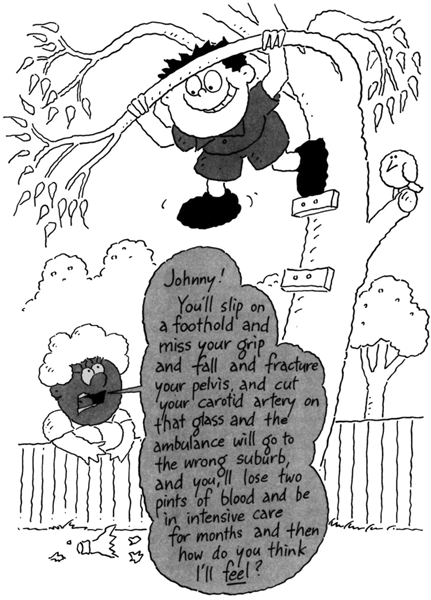
‘Why don’t you apply for that promotion?’
‘No, I’m not good enough.’
‘But he’s just like your last husband. Why did you marry him?’
‘I’m just stupid, I guess.’
‘Why do you let them push you around like that?’
‘That’s the story of my life.’
These words – ‘not good enough’, ‘just stupid’, did not come out of the blue. They are recorded in people’s brains because they were said to them at an age when they were unable to question their truthfulness. ‘But surely,’ I can hear you saying, ‘children must disagree with the “you” messages they are given?’
Certainly children think about the things that are said to them, checking for accuracy. But they may have no comparisons. At times we are all lazy, selfish, untidy, stupid, forgetful, mischievous, and so on. The preacher in the old-time church was on a sure thing when he thundered out, ‘You have sinned!’ – everyone had!
‘Adults know everything; they can even read your mind.’ Such are the thoughts of a child. So when a child is told ‘You’re clumsy’, he or she becomes nervous, and is clumsy. The child told ‘You’re a pest’ feels the rejection, becomes desperate for reassurance and so does pester. The child told ‘You’re an idiot’ may violently disagree on the outside, but inside can only sadly agree. You’re the adult, so you must be right.
‘You’ messages work at both the conscious and unconscious levels. In our work we’ve often asked children to describe themselves, and they will say things like ‘I’m a bad kid’, ‘I’m a nuisance’.
Others, though, will show evidence of confusion – ‘Mum and Dad say they love me, but I don’t think they do’. Consciously they hear the words, but unconsciously they hear/see/smell the feeling behind the words.
It’s all in the way we say it. We can choose to say to children, ‘I’m angry with you and I want you to tidy up your toys NOW!’ and have no fears about lasting effects. If we say, ‘You lazy little brat, why don’t you ever do what you’re told?’ and repeat this kind of message when-ever conflict occurs, then the result will come as no surprise.
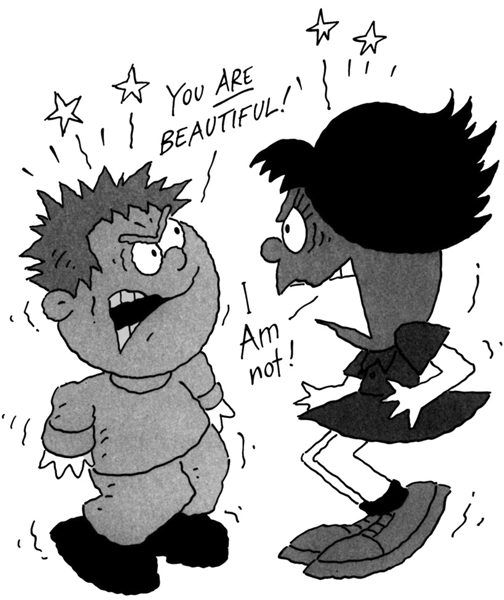
Don’t pretend to be happy or loving when you aren’t feeling that way – it’s confusing and can make children become evasive and in time quite disturbed. We can be honest about our feelings, without putting children down. They can handle ‘I’m really tired today’, or ‘Right now I’m too angry…’ especially if this matches what they have sensed all along. It helps them realise that you are human too, which has got to be a good thing.
At a large parents’ meeting I once addressed, I asked if people would call out the ‘you’ messages they remembered hearing as children. I wrote them on a blackboard and this is what we came up with:

The examples came in little rushes at first, as people’s memories were triggered, but by the end the blackboard was covered and the room was almost in a state of riot. The sense of relief and release was very evident in the large hall as people spoke aloud the words that had hurt them so long ago.
Very few people felt their parents had been deliberately destructive or malicious – it was simply that this was the way children were corrected. ‘Tell them they’re bad and that makes them good!’ Those were the Dark Ages of child-rearing: we’re just beginning to escape.
Your mind remembers everything that ever happened to you
In the 1950s people with epilepsy had a bad time because the medications we now use had not been developed. A man called Penfield found that an operation could be used to help the more severe cases. By making small cuts on the surface of a person’s brain, he could sometimes reduce or even halt the ‘electrical storms’ which cause epileptic seizures.
The interesting part – I hope you’re sitting down as you read this – is that the patients were required, for safety reasons, to be conscious, and the operation was done under only a local anaesthetic. The surgeon removed a small piece of skull, made the cuts and then put back the piece and sewed up the skin. It makes me shudder, too, but it was better than the disease!
During the operation the patients experienced something very surprising. As the doctor, using a fine probe, made tiny contacts with the surface of the brain, the patient would suddenly have vivid recollections – watching Gone with the Wind years earlier, complete with the smell of cheap perfume in the cinema and the beehive hairstyle of the person in front! When the doctor moved the probe to another spot, the person would see before him his fourth birthday party – even though he was wide awake and sitting in the operating chair. It was the same with every patient, though of course the memories were different.
Subsequent research backed up this remarkable discovery: that everything – every sight, sound and spoken word – is stored in our brain. It is often difficult to remember but nevertheless it is there, having its effect. On the wrinkled surface of our brain our life is recorded in its entirety!

Unconscious hearing is a phenomenon that you’ve almost certainly experienced. You’ve been at a party or a meeting, listening to someone near you. The room is buzzing with people talking and perhaps music, too. Suddenly, from a conversation clear across the room, you hear someone say your name, or the name of a friend, or something that concerns you. ‘Aaargh!’ you think, ‘what are they saying about me?’
How does this happen? We have discovered from research that there are two parts to your hearing: firstly, what your ears actually pick up; and secondly, what you pay conscious attention to.
Although you are unaware of it, your brilliant hearing system is filtering every conversation within range in the room and, if a key word or phrase occurs, the switchboard department in your brain ‘puts it through’ to conscious attention. You certainly couldn’t listen to all that was being said at one time but, nonetheless, a primitive filter is scanning it for important messages. We know this from many experiments and also from the fact that under hypnosis people can recall things that they didn’t consciously notice at the time!
The following situation has been reported in many parts of the world.
Late one night a petrol tanker runs out of control, careers down-hill and smashes through the front wall of a house. When rescuers enter the house they are amazed to find a young mother sleeping heavily, undisturbed by the crash. As they stand there, not knowing what to do, a baby begins to cry in the back room. The mother instantly awakes. ‘Wha…what’s going on?’
The filter in her hearing system works on as she sleeps but is checking for only one thing – the baby – and only this sound is ‘put through’ to her mind.
How does all of the above relate to children? Think of all the things that are said about children when they are supposedly not listening. Then remember their acute listening powers (a sweet wrapper at 50 metres!). We may well include the time when they are asleep for there is clear evidence that sounds and speech are taken in even as a person dreams and sleeps.
Also, there is that obvious time when a child has not yet learnt (or decided to let you know) that it can speak. The baby, for months before it speaks much, can follow much of what is intended, if not every word.
I am often amazed by parents, who have been fighting bitterly for years or are desperately unhappy for some reason, telling me, ‘Of course, the kids know nothing about it’. Children, in fact, know almost everything about everything. They may oblige you by keeping it to themselves or only show it indirectly by bedwetting or trying to murder their siblings, but they know. So, if you talk about your children, be sure you are saying what you really want to say. This, too, is a direct channel to their minds.
And why not start to use this channel to boost them by saying what you genuinely like and appreciate to others while they’re in earshot? This is especially useful at ages/stages when direct praise is embarrassing to them.
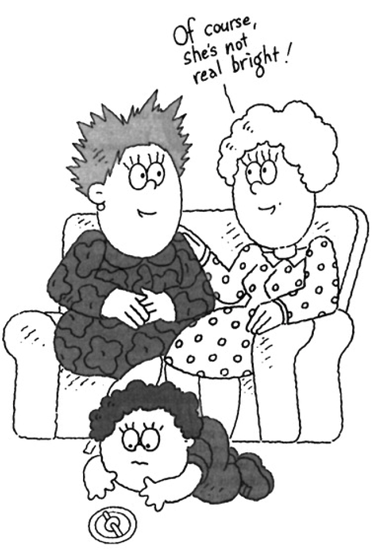
Hearing and healing
This story is told by one of my teachers, Dr Virginia Satir.
A child had just been operated on for tonsil removal and, back in the ward, was failing to stop bleeding. Dr Satir joined the concerned staff in examining the still-open cuts in the child’s throat.
On an impulse, she asked what was happening in the theatre at the time of the operation.
‘Oh, we’d just finished a throat cancer operation on an old lady.’
‘What were you talking about.’
‘Oh that last operation, and how she didn’t have much chance of living – there was too much damage.’
Dr Satir’s mind worked fast. She saw the child undergoing the simple and routine procedure, under general anaesthetic, while the staff talked about the previous patient: ‘not much chance of living’, ‘pretty bad shape’.
Quickly, she asked that the child be taken back to the theatre. She instructed the staff in what to say:
‘Gee this kid looks good and healthy, not like the old lady we operated on before.’ ‘This kid has a nice healthy throat.’ ‘She’ll be healed in a jiffy and back playing with her friends!’
The bleeding stopped, the anaesthetic wore off and the child went home the next day.
Anchoring
Anchoring is one of the most recent discoveries in hypnosis. Scientists have realised that a message goes most deeply into a person’s mind if it is accompanied by other signals that reinforce it.
This is really quite simple.
If a person says to you, ‘You’re a pest!’, you will probably feel rather put out. If he says it with a frown and a loud voice, this will be worse. If he says it very loudly, moves towards you whilst making menacing movements and appears somewhat out of control, then you have a problem.
If he happens to be three times larger than you and is one of your family – on whom your well-being depends – you will probably remember the incident for the rest of your life.
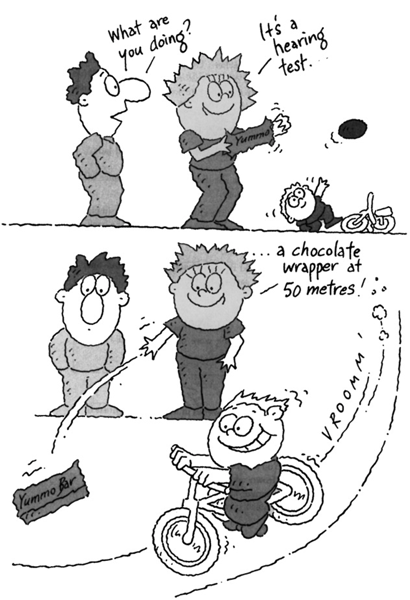
Modern-day men and women, especially those of us of Anglo-Saxon descent, tend to be constrained in our day-to-day life. We do not act or speak with very much passion or force. It’s not that we are low-key and relaxed – just more controlled and bottled up. We tend to keep our good and bad feelings to ourselves and, when things go badly, we try to carry the burden without giving any outward signs. Consequently, when we finally do blow up or break down, we often surprise both ourselves and those around us. If the feeling being released is anger and frustration, then those around us may feel that we have lost control and are dangerous to them…and we may agree!






